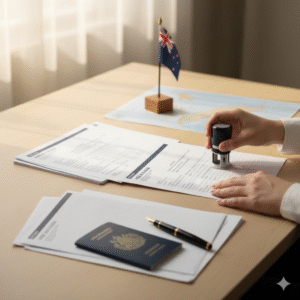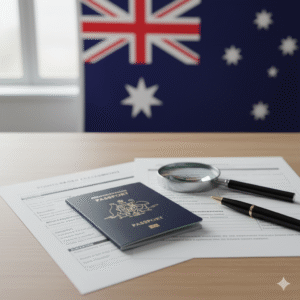A Full Guide to Writing an Immigration Affidavit Letter
An affidavit letter can make or break your immigration case. You need to know how to write a strong affidavit letter if you want to help a family member get a visa, give proof for a marriage-based green card, or help a friend with their citizenship process.
This detailed guide tells you everything you need to know about writing an immigration affidavit letter. You’ll learn what makes an affidavit believable, what information to include, and how to avoid common mistakes that could hurt your case. We’ll also give you examples and templates that you can use to get started.
You’re not the only one who feels overwhelmed by the immigration process. A lot of people are worried about making mistakes because they don’t understand the legal language. This guide makes things easier by giving clear, doable steps that anyone can follow.
What is an Affidavit Letter for Immigration?
An affidavit letter for immigration is a signed and sworn document that gives proof to back up someone’s immigration application. The “affiant,” or person who writes the affidavit, swears that the information they are giving is true and correct.
Immigration officials use these letters to check the facts about an applicant’s relationship, character, or situation. Some common situations that need an affidavit are:
- Applications for green cards based on marriage (Form I-751)
- Affidavits of support for family members
- References of character for citizenship applications
- Proof of real relationships
- Proof of the ability to give financial support
The affidavit is legally binding because it was signed under threat of perjury. This means that giving false information can have serious legal effects.
Why Affidavit Letters Are Important in Immigration Cases
Immigration officers look over thousands of applications. They need solid proof to make sure that relationships are real and that applicants meet all the requirements. An affidavit letter is a third-party statement that backs up what the applicant says.
A good affidavit can:
- Make weak parts of an application stronger
- Give personal context that forms and documents can’t show.
- Show how you are connected to your community and how you can get help.
- Check events or situations that don’t have official records
- Demonstrate how deep and real relationships are
On the other hand, an affidavit that is poorly written or unclear can raise red flags and cause delays or denials.
Important Parts of an Immigration Affidavit Letter
To meet legal requirements and boost credibility, every good affidavit letter should have certain parts.
Affiant’s Private Data
Start with your full legal name, current address, phone number, and email address. Tell us how you know the person and how long you’ve known them. This establishes your credibility as a witness.
Oath and Statement of Truth
You should make it clear that you are making this statement under penalty of perjury in the United States. Most commonly, this would be written as follows: “I, [Your Name], declare under penalty of perjury that the above information is true and correct to the best of my knowledge.”
A full account of the important information
This is the most important part of your affidavit. Give specific, real-life examples that back up the immigration case. Vague statements like “they have a good relationship” carry little weight. Instead, talk about specific things that happened, how people interacted, and what you saw.
Context that helps
Explain how you know the information you’re sharing. Did you see what happened in person? Have you seen how the relationship has changed over time? Giving context to what you know makes your testimony stronger.
Date and sign
Put your name and the date on the affidavit. A lot of immigration applications need the affidavit to be notarized, which makes it more legally valid.
How to Write an Affidavit Letter for Immigration in Steps
Let’s break the process of writing down into small, doable steps.
Step 1: Get the information you need
Get all the information you need before you start writing:
- All parties’ full legal names
- Dates and places of important events
- Specific examples and anecdotes
- The applicant’s past relationships with you
- Any papers that back up what you said
Step 2: Make sure your document is formatted correctly
Use a standard business letter format and professional fonts like Times New Roman or Arial in 11 or 12 points. Add:
- Your contact info at the top
- Date of writing
- The title should be “AFFIDAVIT” or “AFFIDAVIT OF SUPPORT.”
- Body paragraphs that are easy to follow
- Line for a signature with room for a notary
Step 3: Write a Strong Opening Paragraph
Say who you are and why you should be trusted. Please tell us your full name, job, and how you know the person who is applying. Say how long you’ve known them and what you’ve done with them.
Example opening:
“My name is Sarah Johnson, and I am a registered nurse living at 123 Oak Street in Seattle, Washington. I have known Maria Garcia for eight years, first as a neighbor and then as a close family friend. I am writing this affidavit to help her get her status changed because she is married to James Garcia.”
Step 4: Give clear, specific examples
This part should make up most of your affidavit. Use specific examples to show what you’re trying to prove.
For applications based on marriage (I-751 affidavit sample):
Give examples of times when the couple’s relationship was real. Include:
- Social gatherings you attended together
- Holidays or parties you saw
- Daily life observations
- Financial entanglements you’re aware of
- Patterns of communication you’ve seen
This is a sample paragraph for a marriage affidavit:
“I have personally seen James and Maria’s relationship grow over the last three years. I went to their engagement party in June 2025, when both families were there and celebrated their upcoming marriage. Since their wedding in September 2025, I have been to their shared home many times and seen them act like a married couple. They have hosted dinner parties together, made joint decisions about home renovations, and supported each other during hard times. Last November, when Maria’s mother was sick, James went to the hospital with her every day and helped plan family care schedules.”
Step 5: Talk about why the affidavit is needed
Make sure that your letter directly supports the immigration benefit you are asking for. If it’s an affidavit of support, focus on financial capability. If it’s for relationship verification, emphasize the genuine nature of the relationship.
Step 6: Write a clear ending
Reiterate your support for the applicant and summarize your main points. Say that you are willing to give more information if needed.
Step 7: Review and Proofread
Look for mistakes in grammar, spelling, and consistency. Check that all the names and dates are correct. If you can, have someone else look it over.
Step 8: Get the Affidavit Signed by a Notary
Most applications for immigration need to be notarized. You need to bring a government-issued ID to a notary public, sign the document in front of them, and have them fill out the notarization section.

Different Immigration Situations: Examples of Affidavit Letters
Let’s look at some common immigration situations and see how they work.
Sample Affidavit for Immigration Marriage (I-751)
When a couple needs to get rid of conditions on their green card, friends and family can write affidavits saying that the marriage is real.
Important things to include:
- How you know both of the spouses
- Specific interactions you’ve witnessed
- Proof of shared life (joint activities, living arrangements, and financial choices)
- What you saw about how they feel about each other
- A timeline of what you’ve seen
Excerpt from the sample:
“I have known Jennifer and Michael for five years through our church community. I have seen their relationship grow from dating to marriage. They go to church together and do community service as a couple. I have been to their house for dinner several times and have seen them share financial responsibilities, such as buying groceries and keeping their house clean. Last month, they talked about their plans to start a family and their recent purchase of a bigger house together.”
Affidavit of Support for a Family Member
An affidavit of support shows that a sponsor can financially support an immigrant family member so that they don’t become a public charge.
Important things to add:
- The way you know the person who is applying
- Your job and money situation
- Your willingness and ability to help
- The exact promises you’re making
Excerpt:
“I am writing to give my brother, Carlos Martinez, an affidavit of support as he applies for immigrant status. As a software engineer with a steady income of $95,000 a year, I can afford to help Carlos move to the United States. I own my home outright and have no debts. I promise to provide Carlos with housing, food, and money until he can support himself. I have included copies of my recent tax returns and bank statements as proof of my financial stability.”
Affidavit of Relationship for Immigration Sample
These affidavits verify genuine relationships between applicants and their sponsors, particularly important for fiancé visas and family-based petitions.
Important parts to include:
- The history and nature of the relationship
- Patterns of regular communication
- Visits and time spent together
- Talked about plans for the future
- Family or cultural involvement
Things to Avoid When Writing an Affidavit Letter
Affidavits that are meant to help can hurt if they have certain mistakes.
Being Too General or Vague
Saying things like “they seem happy together” or “they’re a nice couple” doesn’t help. Immigration officers need facts that can be checked.
“John and Mary get along well.”
Write: “Over the past two years, I’ve seen John and Mary together at family gatherings, like Thanksgiving 2023 and Christmas 2025. They came together, gave each other thoughtful gifts, and took part in family activities.”
Adding Unnecessary Information
Stay focused on information that helps the immigration benefit directly. Your affidavit is weaker if you go on long tangents about things that aren’t related.
Lying or Making Things Up
Never lie or make things up. If this is found out, the application could be denied, and both you and the applicant could face legal consequences.
Using language that is more emotional than factual
You can talk about how you feel, but most of your affidavit should be based on facts. Let the facts show how you really feel.
Not Proofreading
Your affidavit looks sloppy and less trustworthy because of spelling and grammar mistakes and dates that don’t match up.
Not Having It Notarized When Required
Look up the exact requirements for the immigration benefit you want. Many applications explicitly require notarization.
How to Make Sure Your Affidavit is Reliable
Immigration officers know how to spot affidavits that don’t seem right. To get the most credibility, follow these best practices.
Use a Professional Tone and Language
Use clear, professional English. Don’t use slang, too casual language, or legal jargon that you don’t fully understand.
Be in line with other proof
Make sure your affidavit aligns with other documents in the application. Inconsistencies are a sign of trouble.
Provide Your Contact Information
Give your phone number and email address so that immigration officials can get in touch with you if they need to confirm what you said.
Stick to What You Know
Write only about things that you have seen or done yourself. Don’t guess or include things you’ve heard.
Give exact dates and information
Instead of saying “recently” or “a while ago,” give specific dates or time frames. This makes things more accurate and believable.
Offer to Provide Additional Information
End by saying that you’re happy to answer questions or give more information if needed.
Legal Things to Think About and Ethical Rules
It’s very important to know what writing an affidavit means legally.
How to Know About Perjury Laws
When you sign an affidavit under penalty of perjury, you’re swearing that your statements are true. Giving false information on purpose is perjury, which is a serious crime that can lead to jail time and fines.
When to Seek Legal Advice
If you’re not sure if you should write an affidavit or what to put in it, talk to an immigration lawyer. This is very important if:
- There are complicated legal issues in the case.
- You are worried about being held responsible.
- You don’t know if some information is correct.
- The applicant has a complicated history with immigration.
Respecting Privacy and Keeping Things Private
You can only share information that the applicant has given you permission to share. Give them useful evidence while still respecting their privacy.
Knowing Your Rights
If you don’t want to write an affidavit, you don’t have to. You don’t have to give testimony that makes you feel unsure.
How to Format Your Affidavit for Different Immigration Applications
Affidavits may have different requirements for different immigration applications.
Affidavits for Form I-751 (Removal of Conditions)
These affidavits should mostly talk about things like doing things together, living together, sharing money, and proof that the marriage is still going on. Include at least 2-3 specific dated examples.
Affidavits for Applying for a Visa
There may be certain formatting rules that embassy affidavits must follow for each country. For rules, get in touch with the right embassy or consulate.
Affidavits for Applications for Citizenship
Character reference letters for naturalization should emphasize the applicant’s good moral character, community involvement, and respect for U.S. laws.
How to Send in Your Affidavit Letter
You need to send in your affidavit the right way once it is finished and notarized.
Add Original Signatures
Most applications need affidavits with original signatures, not copies. You might have to sign more than one original copy of an affidavit if you are sending them to more than one agency.
Keep Copies for Your Records
Before you send in your signed and notarized affidavits, make copies of them. This keeps you safe in case papers get lost and gives you a place to go for future questions.
Follow Submission Instructions Carefully
Each application will tell you how to send in your affidavits. Some people need them with the first application, while others may ask for them later.
Frequently Asked Questions About Immigration Affidavits
How long should an affidavit letter be?
Affidavits that work best are one to two pages long. This gives you enough room to add important details without making it too long to read.
Do affidavits have to be written in English?
Yes, all papers sent to U.S. immigration officials must be in English. You will need a certified translation if you wrote the affidavit in a different language.
Is it possible for me to write an affidavit if I’m not a U.S. citizen?
Yes, people who aren’t citizens can write affidavits for immigration cases. But affidavits from U.S. citizens or lawful permanent residents may be more important.
How many affidavits does an application need?
This depends on the type of case. For applications based on marriage, two to three strong affidavits are usually enough. If they repeat themselves, more affidavits don’t always help.
Is it okay to email a scanned affidavit?
This depends on what the application needs in particular. Some processes let you send in documents electronically, while others need you to send in original documents by mail. Always read the official directions.
What if I made a mistake in my statement?
If you find a mistake after you submit your application, call an immigration lawyer right away. You can sometimes send in a corrected affidavit with an explanation.
Moving Forward in Your Immigration Journey
It doesn’t have to be hard to write an affidavit letter for immigration. You can make a strong document that really helps someone’s immigration case by following the steps in this article.
Keep these important points in mind:
- Give specific examples and be clear.
- Stick to what you know for sure
- Use the right format and language for business
- Notarize your affidavit when you need to.
- Check your work carefully before sending it in.
There are a lot of complicated forms, strict deadlines, and specific requirements that must be met during the immigration process. One mistake can cause delays or denials that change someone’s whole future.
If you’re helping someone with their immigration case and aren’t sure about any part of the process, getting help from a professional can make a big difference. At Business Kiwi, our knowledgeable staff helps people confidently deal with the complicated paperwork that comes with immigration. We offer personalized help that is specific to your needs, making sure that every document meets the highest standards.
We’re here to help you with anything from writing an affidavit to looking over your immigration application to figuring out what you need to do for your case. We want to make the immigration process as easy and stress-free as possible so you can focus on what matters most: taking care of your family.
Don’t let doubt or confusion stop you. Call Business Kiwi today to set up a consultation and start the process of getting your immigration case settled.







